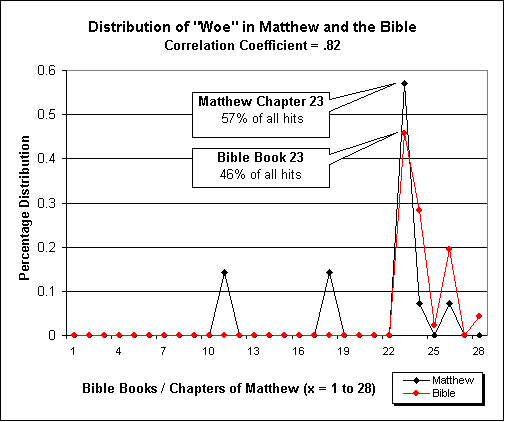


Spoke 1
Matthew 23  Book 23 (Isaiah) Book 23 (Isaiah)
Woe unto you, scribes and Pharisees, hypocrites! for ye are like unto
whited sepulchres, which indeed appear beautiful outward, but are within full of dead
menís bones, and of all uncleanness. Even so ye also outwardly appear righteous unto
men, but within ye are full of hypocrisy and iniquity.
Matthew 23:1 (Inner Cycle: Spoke 1, Cycle 2)
Matthew 23 contains the Lord's great castigation of the religious and political
leaders, who in Hebrew are called the Aluphim,
which is an Aleph KeyWord.
He declares woe unto you to them no less
than eight times in this one chapter. This correlates with the distribution of
the word "woe" in the first 28 Books of the Bible, as shown in the graph below:

The correlation is truly astounding. Not only do the peaks coincide at point 23, but the
graphs rise and fall together thereafter! This causes the correlation coefficient to attain
the very high value of .82, which is way outside the realm of chance.
We can represent this link as a Key in the following fashion:

And now we can witness one of the most amazing featrures of God's Word. In the article called
The Gospel Goes Forth! the deep supernatural
integration of Isaiah Chapter 40 with Bible Book 40 is discussed. In that article,
I represented the link as a Key similiar to the one above:

And now we can see a little more of the infinite Wisdom of God: these two keys fit together like a pair
of puzzle peices!

Note the positive/negative semantic symmetry - woe versus comfort. What can mere dust say to
such beauty, but glory to God who has given us His Holy Word!
Yet this is but the beginning. Returning to the verse above, we note that
Jesus made two accusations against the rulers,
hypocrisy and iniquity. These words are found in one and only one other
verse of the Bible, Isaiah 32.5:
The vile person shall be no more called liberal, nor the churl said to be bountiful.
For the vile person will speak villany, and his heart will work iniquity, to practise
hypocrisy, and to utter error against the LORD, to make empty the soul of the
hungry, and he will cause the drink of the thirsty to fail. The instruments also of the
churl are evil: he deviseth wicked devices to destroy the poor with lying words, even
when the needy speaketh right.
We have a KJV KeyLink between Matthew Chapter 23 and Book 23
based on the simple set (iniquity, hypocrisy) [Verify]:
 | KeyLink: Hypocrisy and Iniquity | PBible( 23 )  PMatthew( 23 ) PMatthew( 23 ) |
Note that in Matthew 23, Jesus said the rulers "outwardly appear righteous unto
men, but within ye are full of hypocrisy and iniquity." Precisely the same idea is
communicated in the KeyLinked passage from Isaiah, where God says that
the "churl" (a fraudulent, deceitful, or crafty person) would no longer be "said to
be bountiful." In other words, he would be revealed for what he really was.
The word translated as "churl" comes from the Hebrew root  (khuwl), in the sense of "to seize."
It refers to stingy and morose folk who "hold back" from others. This is the sin that Jesus
so strongly spoke against in Matthew 23 (vs. 13):
(khuwl), in the sense of "to seize."
It refers to stingy and morose folk who "hold back" from others. This is the sin that Jesus
so strongly spoke against in Matthew 23 (vs. 13):
But woe unto you, scribes and Pharisees, hypocrites! for ye shut up the kingdom
of heaven against men: for ye neither go in yourselves, neither suffer ye them that are
entering to go in.
The burdens these leaders laid on the people were truly horendous. Turning to the first
verses of Matthew 23 we read:
Then spake Jesus to the multitude, and to his disciples, Saying, The scribes
and the Pharisees sit in Mosesí seat: All therefore whatsoever they bid you observe,
that observe and do; but do not ye after their works: for they say, and do not. For
they bind heavy burdens and grievous to be borne, and lay them on menís shoulders;
but they themselves will not move them with one of their fingers.
Searching the entire KJV for all verses that contain the phrase "heavy burdens" yields exactly
one other verse. We read from Book 23 (Isaiah 58.4):
Behold, ye fast for strife and debate, and to smite with the fist of
wickedness: ye shall not fast as ye do this day, to make your voice to be heard on high.
Is it such a fast that I have chosen? a day for a man to afflict his soul? is it to bow
down his head as a bulrush, and to spread sackcloth and ashes under him? wilt thou call
this a fast, and an acceptable day to the LORD? Is not this the fast that I have chosen?
to loose the bands of wickedness, to undo the heavy burdens, and to let the oppressed
go free, and that ye break every yoke? Is it not to deal thy bread to the hungry,
and that thou bring the poor that are cast out to thy house? when thou seest the
naked, that thou cover him; and that thou hide not thyself from thine own flesh?
Note that the Lord exposes false religiosity in the first sentence, in perfect
harmony with the castigation Jesus poured out upon the Aluphim. We have another
KeyLink between the chapter sequence of Matthew and the order of the Canon:
 | KeyLink: Heavy Burdens | PBible( 23 )  PMatthew( 23 ) PMatthew( 23 ) |
| 
